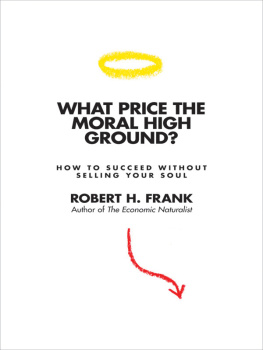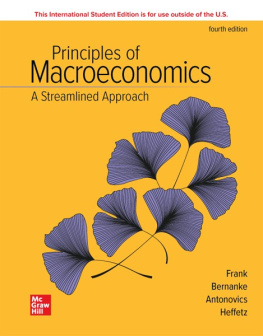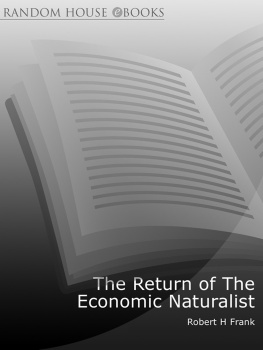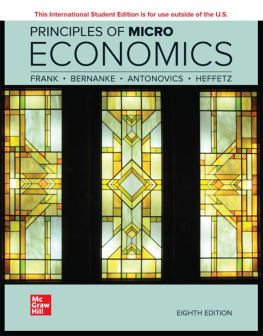
What Price the Moral High Ground?
What Price the Moral High Ground?
Ethical Dilemmas in Competitive Environments
ROBERT H. FRANK
Princeton University Press Princeton and Oxford
Copyright 2004 by Princeton University Press
Published by Princeton University Press,
41 William Street, Princeton, New Jersey 08540
In the United Kingdom: Princeton University Press,
6 Oxford Street, Woodstock, Oxfordshire OX20 1TW
press.princeton.edu
ALL RIGHTS RESERVED
First printing, 2004
Paperback reissue, 2010
ISBN: 978-0-691-14694-2
Library of Congress Control Number 2009941950
British Library Cataloging-in-Publication Data is available
This book has been composed in Electra
Printed on acid-free paper.
Printed in the United States of America
10 9 8 7 6 5 4 3 2 1
Contents
Introduction
Infectious Good
W ITH REVELATIONS OF corporate accounting scandals dominating the news in the summer of 2002, United States Federal Reserve Chairman Alan Greenspan told a Senate banking committee in Washington that leaders of Americas business community appeared to be in the grip of infectious greed. The problem, in his view, was not that humans have become any more greedy than in generations past, but rather that the avenues to express greed have grown so enormously.
Many saw the scandals as confirming the cynical view that doing well (successfully pursuing ones narrow self-interest) is accomplished entirely at the expense of doing good (respecting the legitimate interests of others, even when no one is looking). As conventionally taught, both economic theory and evolutionary psychology are not only consistent with this view, but also provide intellectual ammunition for it. The argument, in brief, is that while the world might indeed be a better place if people restrained themselves for the common good, competitive pressures make it nave to expect that anyone will do so.
The notion of contagion figures prominently in this argument. Most citizens, for example, recognize the need for the government to collect taxes to finance public services, and are prepared to do their part. Yet experience has shown that vigorous enforcement measures are necessary to maintain high rates of tax compliance. If it becomes known that people can claim questionable tax exemptions without penalty, many will do so, and their actions inevitably pressure others to respond in kind. Over time, the standards that define acceptable conduct shift. This dynamic surely played an important part in the recent corporate accounting scandals. Accounting practices that would have seemed beyond the pale in an earlier environment came to be viewed as acceptable once they became more commonplace.
Both economic theory and evolutionary theory, as historically taught, encourage the hard-nosed view that the only way to sustain pro-social behavior is through strict rules and sanctions. Homo economicus does not return a strangers wallet if he finds it on a street corner; nor does he make anonymous donations to charity; nor does he vote in presidential elections; nor does he leave tips when dining in a restaurant he does not expect to visit again. By the same token, the stereotypical Darwinian actor does not help a victim in distress unless that victim is likely to return the favor or is a sufficiently close genetic relative. The expectation encouraged by these theories is that people are willing to make sacrifices for the common good only if society can confront them with significant penalties when they fail to do so.
This expectation is almost certainly incorrect. Indeed, recent theoretical and empirical insights in both economics and biology suggest a more nuanced view. On the empirical front, there is persuasive evidence that in many situations we simply do not behave in the narrowly self-interested ways predicted by traditional theories. We usually leave tips when dining on the road, for example, and millions of us vote in presidential elections. Most of us incur avoidable costs in these and a host of other situations in which we could behave opportunistically with no possibility of penalty. On the theoretical front, we are now poised to understand why being predisposed to incur such costs need not entail significant penalties, even in the bitterly competitive environments thought to be most hostile to this posture.
In the essays in this volume, I summarize a variety of arguments and evidence that bear on the spontaneous emergence of pro-social behavior. The better we are able to appreciate how such behavior can emerge independently of external rewards and sanctions, the better we will be able to shape institutions that encourage desired outcomes, and the better we will be able to sidestep the institutional design disasters that have plagued us in recent years.
The essays in ends more effectively by abandoning the direct pursuit of self-interest. This idea is a special case of the broader notion that people can often improve their lot by making commitments that foreclose valuable optionsas, for example, when someone believed to be scrupulously honest is for that reason promoted to fill an important, well-paying job that entails strong temptations to cheat.
For an honest person to be favored in this way, it is necessary that others be able to make accurate assessments about his or her character. The obvious difficulty is that the rewards for successful mimicry are often enormous. If there are gains from being honest, there would be even larger gains from merely appearing to be honest. In (Can Cooperators Find One Another?) I report the results of experiments conducted in collaboration with my Cornell colleagues Tom Gilovich and Dennis Regan in which subjects were given a risk-free opportunity to earn more money by cheating their partner in a simple game. Contrary to the predictions of traditional models, almost 75 percent did not avail themselves of this opportunity; and more important, those subjects who predicted their partners would cheat were correct at more than twice chance accuracy rates.
suggests the possibility of a much closer link between rationality and morality. Without claiming the two concepts are identical, it suggests that a rational individual will often be unlikely to achieve his material ends if the moral emotions are missing from his character.
Many economists and business ethicists point out that because firms are not people, it is a mistake to expect them to adhere to moral norms like the ones that govern interpersonal relations. Yet firms are owned by discusses a variety of separate mechanisms whereby a firm that incurs additional costs in going beyond what is required by law is nonetheless able to prosper in competition with more opportunistic rivals.
The chapters in attempts to assess the strength of pro-social motivations by examining the wage premium for performing morally suspect tasks (such as testifying before Congress that exposure to secondhand smoke has not been proved to cause illness). When it comes to explaining why some people earn more than others, even crude measures of employer and occupational moral merit have far more power than traditional economic wage determinants like education, training, and experience.
Traditional economic theory holds that wages within a firm will closely track individual employee contributions to the firms bottom line. Yet in virtually every firm, individual wages vary far less than individual productivity. describes an intra-firm theory of justice according to which workers can enjoy a high-ranking position vis--vis their co-workers only if they are willing, in effect, to share a substantial share of their pay with them.
Next page











